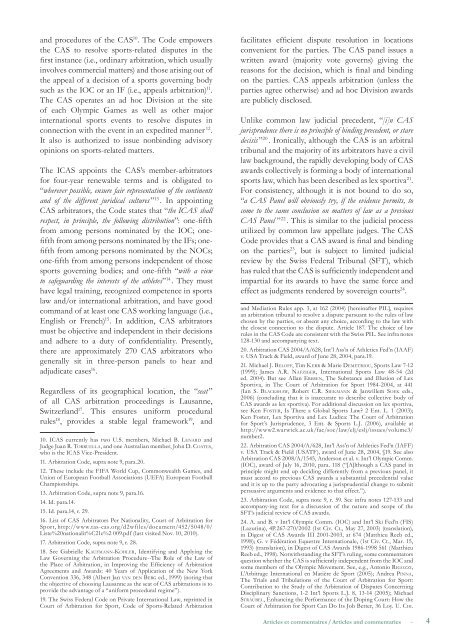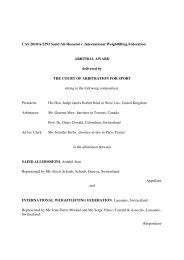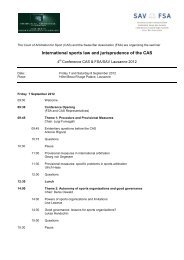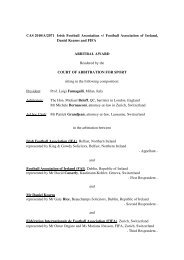(CAS) Bulletin - Tribunal Arbitral du Sport / TAS
(CAS) Bulletin - Tribunal Arbitral du Sport / TAS
(CAS) Bulletin - Tribunal Arbitral du Sport / TAS
Create successful ePaper yourself
Turn your PDF publications into a flip-book with our unique Google optimized e-Paper software.
and proce<strong>du</strong>res of the <strong>CAS</strong> 10 . The Code empowers<br />
the <strong>CAS</strong> to resolve sports-related disputes in the<br />
fi rst instance (i.e., ordinary arbitration, which usually<br />
involves commercial matters) and those arising out of<br />
the appeal of a decision of a sports governing body<br />
such as the IOC or an IF (i.e., appeals arbitration) 11 .<br />
The <strong>CAS</strong> operates an ad hoc Division at the site<br />
of each Olympic Games as well as other major<br />
international sports events to resolve disputes in<br />
connection with the event in an expedited manner 12 .<br />
It also is authorized to issue nonbinding advisory<br />
opinions on sports-related matters.<br />
The I<strong>CAS</strong> appoints the <strong>CAS</strong>’s member-arbitrators<br />
for four-year renewable terms and is obligated to<br />
“wherever possible, ensure fair representation of the continents<br />
and of the different juridical cultures ” 13 . In appointing<br />
<strong>CAS</strong> arbitrators, the Code states that “the I<strong>CAS</strong> shall<br />
respect, in principle, the following distribution”: one-fi fth<br />
from among persons nominated by the IOC; onefi<br />
fth from among persons nominated by the IFs; onefi<br />
fth from among persons nominated by the NOCs;<br />
one-fi fth from among persons independent of those<br />
sports governing bodies; and one-fi fth “with a view<br />
to safeguarding the interests of the athletes” 14 . They must<br />
have legal training, recognized competence in sports<br />
law and/or international arbitration, and have good<br />
command of at least one <strong>CAS</strong> working language (i.e.,<br />
English or French) 15 . In addition, <strong>CAS</strong> arbitrators<br />
must be objective and independent in their decisions<br />
and adhere to a <strong>du</strong>ty of confi dentiality. Presently,<br />
there are approximately 270 <strong>CAS</strong> arbitrators who<br />
generally sit in three-person panels to hear and<br />
adjudicate cases 16 .<br />
Regardless of its geographical location, the “seat ”<br />
of all <strong>CAS</strong> arbitration proceedings is Lausanne,<br />
Switzerland 17 . This ensures uniform proce<strong>du</strong>ral<br />
rules 18 , provides a stable legal framework 19 , and<br />
10. I<strong>CAS</strong> currently has two U.S. members, Michael B. LENARD and<br />
Judge Juan R. TORRUELLA, and one Australian member, John D. COATES,<br />
who is the I<strong>CAS</strong> Vice-President.<br />
11. Arbitration Code, supra note 9, para.20.<br />
12. These include the FIFA World Cup, Commonwealth Games, and<br />
Union of European Football Associations (UEFA) European Football<br />
Championships.<br />
13. Arbitration Code, supra note 9, para.16.<br />
14. Id. para.14.<br />
15. Id. para.14, r. 29.<br />
16. List of <strong>CAS</strong> Arbitrators Per Nationality, Court of Arbitration for<br />
<strong>Sport</strong>, http://www.tas-cas.org/d2wfiles/document/452/5048/0/<br />
Liste%20nationalit%C21e%2 009.pdf (last visited Nov. 10, 2010).<br />
17. Arbitration Code, supra note 9, r. 28.<br />
18. See Gabrielle KAUFMANN-KOHLER, Identifying and Applying the<br />
Law Governing the Arbitration Proce<strong>du</strong>re--The Role of the Law of<br />
the Place of Arbitration, in Improving the Effi ciency of Arbitration<br />
Agreements and Awards: 40 Years of Application of the New York<br />
Convention 336, 348 (Albert Jan VAN DEN BERG ed., 1999) (noting that<br />
the objective of choosing Lausanne as the seat of <strong>CAS</strong> arbitrations is to<br />
provide the advantage of a “uniform proce<strong>du</strong>ral regime”).<br />
19. The Swiss Federal Code on Private International Law, reprinted in<br />
Court of Arbitration for <strong>Sport</strong>, Code of <strong>Sport</strong>s-Related Arbitration<br />
facilitates effi cient dispute resolution in locations<br />
convenient for the parties. The <strong>CAS</strong> panel issues a<br />
written award (majority vote governs) giving the<br />
reasons for the decision, which is fi nal and binding<br />
on the parties. <strong>CAS</strong> appeals arbitration (unless the<br />
parties agree otherwise) and ad hoc Division awards<br />
are publicly disclosed.<br />
Unlike common law judicial precedent, “[i]n <strong>CAS</strong><br />
jurisprudence there is no principle of binding precedent, or stare<br />
decisis ” 20 . Ironically, although the <strong>CAS</strong> is an arbitral<br />
tribunal and the majority of its arbitrators have a civil<br />
law background, the rapidly developing body of <strong>CAS</strong><br />
awards collectively is forming a body of international<br />
sports law, which has been described as lex sportiva 21 .<br />
For consistency, although it is not bound to do so,<br />
“a <strong>CAS</strong> Panel will obviously try, if the evidence permits, to<br />
come to the same conclusion on matters of law as a previous<br />
<strong>CAS</strong> Panel ” 22 . This is similar to the judicial process<br />
utilized by common law appellate judges. The <strong>CAS</strong><br />
Code provides that a <strong>CAS</strong> award is fi nal and binding<br />
on the parties 23 , but is subject to limited judicial<br />
review by the Swiss Federal <strong>Tribunal</strong> (SFT), which<br />
has ruled that the <strong>CAS</strong> is suffi ciently independent and<br />
impartial for its awards to have the same force and<br />
effect as judgments rendered by sovereign courts 24 .<br />
and Mediation Rules app. 3, at 162 (2004) [hereinafter PIL], requires<br />
an arbitration tribunal to resolve a dispute pursuant to the rules of law<br />
chosen by the parties, or absent any choice, according to the law with<br />
the closest connection to the dispute. Article 187. The choice of law<br />
rules in the <strong>CAS</strong> Code are consistent with the Swiss PIL. See infra notes<br />
128-130 and accompanying text.<br />
20. Arbitration <strong>CAS</strong> 2004/A/628, Int’l Ass’n of Athletics Fed’n (IAAF)<br />
v. USA Track & Field, award of June 28, 2004, para.19.<br />
21. Michael J. BELOFF, Tim KERR & Marie DEMETRIOU, <strong>Sport</strong>s Law 7-12<br />
(1999); James A.R. NAFZIGER, International <strong>Sport</strong>s Law 48-54 (2d<br />
ed. 2004). But see Allan ERBSEN, The Substance and Illusion of Lex<br />
<strong>Sport</strong>iva, in The Court of Arbitration for <strong>Sport</strong> 1984-2004, at 441<br />
(Ian S. BLACKSHAW, Robert C.R. SIEKMANN & Janwillem SOEK eds.,<br />
2006) (concluding that it is inaccurate to describe collective body of<br />
<strong>CAS</strong> awards as lex sportiva). For additional discussion on lex sportiva,<br />
see Ken FOSTER, Is There a Global <strong>Sport</strong>s Law? 2 Ent. L. 1 (2003);<br />
Ken Foster, Lex <strong>Sport</strong>iva and Lex Ludica: The Court of Arbitration<br />
for <strong>Sport</strong>’s Jurisprudence, 3 Ent. & <strong>Sport</strong>s L.J. (2006), available at<br />
http://www2.warwick.ac.uk/fac/soc/law/elj/eslj/issues/volume3/<br />
number2.<br />
22. Arbitration <strong>CAS</strong> 2004/A/628, Int’l Ass’n of Athletics Fed’n (IAFF)<br />
v. USA Track & Field (USATF), award of June 28, 2004, §19. See also<br />
Arbitration <strong>CAS</strong> 2008/A/1545, Anderson et al. v. Int’l Olympic Comm.<br />
(IOC), award of July 16, 2010, para. 118 (“[A]lthough a <strong>CAS</strong> panel in<br />
principle might end up deciding differently from a previous panel, it<br />
must accord to previous <strong>CAS</strong> awards a substantial precedential value<br />
and it is up to the party advocating a jurisprudential change to submit<br />
persuasive arguments and evidence to that effect.”).<br />
23. Arbitration Code, supra note 9, r. 59. See infra notes 127-133 and<br />
accompany-ing text for a discussion of the nature and scope of the<br />
SFT’s judicial review of <strong>CAS</strong> awards.<br />
24. A. and B. v Int’l Olympic Comm. (IOC) and Int’l Ski Fed’n (FIS)<br />
(Lazutina), 4P.267-270/2002 (1st Civ. Ct., May 27, 2003) (translation),<br />
in Digest of <strong>CAS</strong> Awards III 2001-2003, at 674 (Matthieu Reeb ed.,<br />
1998); G. v Fédération Equestre Internationale, (1st Civ. Ct., Mar. 15,<br />
1993) (translation), in Digest of <strong>CAS</strong> Awards 1986-1998 561 (Matthieu<br />
Reeb ed., 1998). Notwithstanding the SFT’s ruling, some commentators<br />
question whether the <strong>CAS</strong> is suffi ciently independent from the IOC and<br />
some members of the Olympic Movement. See, e.g., Antonio RIGOZZI,<br />
L’Arbitrage International en Matière de <strong>Sport</strong> (2005); Andrea PINNA,<br />
The Trials and Tribulations of the Court of Arbitration for <strong>Sport</strong>:<br />
Contribution to the Study of the Arbitration of Disputes Concerning<br />
Disciplinary Sanctions, 1-2 Int’l <strong>Sport</strong>s L.J. 8, 13-14 (2005); Michael<br />
STRAUBEL, Enhancing the Performance of the Doping Court: How the<br />
Court of Arbitration for <strong>Sport</strong> Can Do Its Job Better, 36 Loy. U. CHI.<br />
Articles et commentaires / Articles and commentaries<br />
-<br />
4





